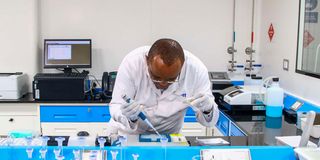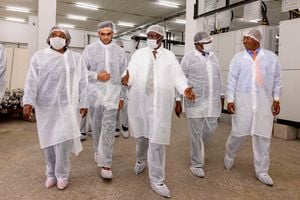How new microbiology lab will transform testing of medicines in the country

Eric Ngamau, Microbiologist at Mission for Essential Drugs and Supplies(MEDS) collects sample solutions at the Microbiology laboratory area at MEDS headquarters along Mombasa Road on November 15, 2023.
What you need to know:
As a supply chain organisation, Meds supplies pharmaceutical medicines to the health facilities in Kenya and beyond.However, the organisation has not been in a position to check for microbial contamination.
Testing for microbial contamination in medical products in the country is set to go a notch higher with a second microbiology laboratory in Kenya that will be launched today.
For 27 years, the Mission for Essential Drugs and Supplies (Meds) — a faith-based, not-for-profit organisation — has been conducting physical chemical testing on pharmaceutical products and outsourcing for microbial contamination testing from the National Quality Control Laboratory at a fee.
As a supply chain organisation, Meds supplies pharmaceutical medicines to the health facilities in Kenya and beyond. However, the organisation has not been in a position to check for microbial contamination.
“These had limitations because we could only take whatever they (National Quality Control Laboratory)were able to offer. Now, we can test any product as we continue to invest in new tests that are done in our laboratory,” said Dr Stephen Thiongo, the head of quality service at Meds.
The microbiology laboratory will be able to conduct sterility testing by membrane filtration, growth promotion test of microbiological media, microbiological assays, microbial limit testing, bioburden testing, water testing, environmental monitoring of clean rooms and bacterial endotoxin testing.
“As manufacturers come up with new innovative ways of manufacturing and new products, it is important for us as an organsation to be able to grow and meet the needs and requirements of the manufacturers,” said Dr Thiongo.
.

Sample solutions inside the Microbiology laboratory at Mission for Essential Drugs and Supplies(MEDS) headquarters along Mombasa Road on November 15, 2023.
In the last 27 years, tasks for the laboratory at the organisation have been increasing. Through its wet laboratory, the facility was only doing physical-chemical testing. The microbiology element was missing.
The physical-chemical testing meant that the organisation was only checking whether all the pharmaceutical products that they were supplying to their clients met the requirements in terms of active ingredients that met the requirements of any physical test like dissolution.
“We had a limitation. After checking whether the products met the active ingredient requirements, we could not check whether it had microbial contamination. All we did was to subcontract other laboratories, which came at a cost,” he said. That created the need of the microbiology laboratory to be able to conduct such tests.
For instance, sterile preparation goes directly into the bloodstream. If the manufacturing process is not conducted properly and microbial contamination enters the product, this will harm the patient as the product is administered.
“This is the reason why it is very important to check that no pharmaceutical product that comes into the country is contaminated and that the product is sterile. The facility has the capacity to check and limit microbial contamination in critical products,” Dr Thiongo said.
Pharmaceutical ingredients
He clarified there are products for which the active pharmaceutical ingredients can only be determined using microbiological methods.
“The facility gives us an extended scope to be able to check that the products have required contents,” he said. Meds has started medical devices units, where sterility testing of medical devices will be done for health facilities.
The organisation’s biggest customer is the Ministry of Health and the Pharmacy and Poisons Board, a regulatory agency tasked with vetting the country’s medical products.
“Quality is very important. We can have very expensive products but if they do not meet the quality, then they cannot be consumed by patients,” said Dr Thiongo, adding that falsified products have become the norm in the world.
The laboratory, which cost more than Sh100 million, will complement the physical chemical testing which will be conducting testing on oral dosage medicines (tablets and capsules). However, the microbiology testing will be mainly for syrup, suspensions, and ointments whose manufacturing process is tedious.
“Looking at the content of the products, sometimes they encourage the growth of microbes and high rates of microbial contamination. In addition to chemical testing where we want to determine whether the active ingredients are correct, we will be going ahead and checking microbial contamination to ensure that manufacturing was done correctly,” said Dr Thiongo.
He added that the products are very sensitive, given how they are used. For quality to be assured, he noted, microbial contamination testing has to be done. “The missing element for us was being able to offer the complete test and with the laboratory, we assure Kenyans of quality products from our warehouses,” he said. According to the World Health Organisation, substandard and falsified medicines kill hundreds of thousands of people globally. In Africa, 100,000 people die every year from taking falsified or substandard medicines. WHO says that between 2019 and this year, about 43 reports of falsified medicines were reported, with many of them resulting in fatality.
The international health agency also indicated that up to two billion people around the world lack access to necessary medicines, vaccines, medical devices including in vitro diagnostics, and other health products, which creates a vacuum that is too often filled by substandard and falsified products.
“This problem is growing as global supply chains become more complex, meaning products manufactured in one country may be packaged in a second country and distributed across borders to be marketed or sold to consumers in a third country. The growth of e-commerce also contributes to this trend by making it easier to purchase medicines online, often from unauthorised sources,” says the WHO.
Diagnostic kits
The organisation further states that more than one in ten medicines in low- and middle-income countries are estimated to be substandard or falsified including pills, vaccines and diagnostic kits: “No country remains untouched from this issue. Both generic and innovator medicines can be falsified, ranging from very expensive products for cancer to very inexpensive products for treatment of pain.”

Mildred Wanyama, a Lab Manager at Mission for Essential Drugs and Supplies(MEDS) explains operations in the Microbiology Laboratory on November 15, 2023.
WHO member states, including Kenya, have agreed on a comprehensive global strategy focused on prevention, detection and response to move towards achieving increased access to quality, safe, effective and quality medical products.
Recently, the Pharmacy and Poisons Board recalled children’s syrups over safety concerns that they did not meet the active ingredient requirements. This year alone, the agency has blacklisted new drugs which were already in the markets and being used by patients. This sent a signal on the quality of drugs being prescribed to Kenyans.
“This is why the microbiology laboratory serves as an important tool for quality assurance. We test our medicines to ensure that they meet the desired quality requirement and there is no contamination into the patient’s body,” said Dr Thiongo.
The laboratory has a capacity of testing over 3,000 samples a year. It makes use of three microbiologists with equipment large enough to conduct simultaneous incubation for many samples awaiting WHO pre-qualification. The laboratory has featured in the organisation’s strategic plan for the last 10 years but in 2019, the approval for the concept was given.
“We used the WHO specifications for a pharmaceutical testing microbiology laboratory. This ushers us into a new dimension of not just testing the basic pharmaceuticals but going into complex products including vaccines,” Dr Thiongo said.
He added that the organisation was looking at areas whereby bioequivalence for setting up clinical trials becomes an important regulatory step for product registration.
“We, as a laboratory, want to be prepared to be able to supplement government effort in regulation. The lab will offer basic pharmaceutical testing. At the same time, we will move to other complex areas,” he said.
Dr Fred Siyoi, the chief executive officer of the Pharmacy and Poisons Board, said that such a facility was important in the country since it reduces consumer risks and while complying with the market standards.
“As a regulatory body, we have ensured through our pharmacovigilance department that substandard products are not brought into the country,” Dr Siyoi said. “With the kind of setup in the facility, we are sure of getting accurate results about various products in the market.”
Dr Wycliffe Nandama, the Meds managing director, said the laboratory will provide health solutions and address a number of issues that many countries are dealing with, including counterfeit and substandard medicines in the market.
“And it does not just test for medicines from its own suppliers but also for samples brought on request. We are here to give quality, genuine and products that meet standards for many countries in Africa and even beyond,” he said.




